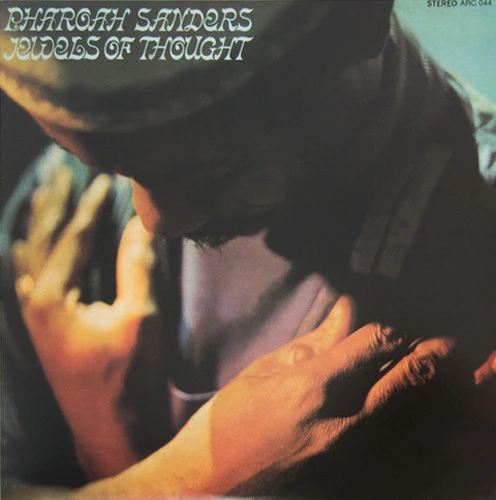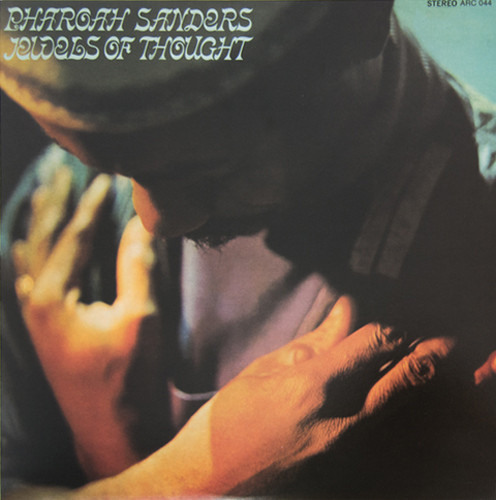Explorations Of African Mysticism On Vinyl LP!
Includes The Astonishing "Sun In Aquarius"!
Pharoah Sanders possesses one of the most distinctive tenor saxophone sounds in jazz. Harmonically rich and heavy with overtones, Sanders' sound can be as raw and abrasive as it is possible for a saxophonist to produce. Yet, Sanders is highly regarded to the point of reverence by a great many jazz fans. He made his name with expressionistic, nearly anarchic free jazz in John Coltrane's late ensembles of the mid-'60s. The hallmarks of Sanders' playing at that time were naked aggression and unrestrained passion. In the years after Coltrane's death, however, Sanders explored other, somewhat gentler and perhaps more cerebral avenues without, it should be added, sacrificing any of the intensity that defined his work as an apprentice to Coltrane.
Coltrane's ensembles with Sanders were some of the most controversial in the history of jazz. Their music represents a near total desertion of traditional jazz concepts, like swing and functional harmony, in favor of a teeming, irregularly structured, organic mixture of sound for sounds sake. Strength was a necessity in that band, and as Coltrane realized, Sanders had it in abundance.
Sanders made his first record as a leader in 1964. Jewels of Thought was recorded at Plaza Sound Studios in New York City on October 20, 1969, and was released on Impulse! Records in the same year.
"In 1969, Pharoah Sanders was incredibly active, recording no less than four albums and releasing three. The band on Jewels of Thought is largely the same as on Deaf Dumb Blind and Karma, with a few changes. Idris Muhammad has, with the exception of 'Hum-Allah-Hum-Allah Hum Allah,' replaced Roy Haynes, and Richard Davis has permanently replaced Reggie Workman and Ron Carter, though Cecil McBee is still present for the extra bottom sound. Leon Thomas and his trademark holy warble are in the house, as is Lonnie Liston Smith. Comprised of two long cuts, the aforementioned and 'Sun in Aquarius,' Jewels of Thought sees Sanders moving out from his signature tenor for the first time and delving deeply into reed flutes and bass clarinet. The plethora of percussion instruments utilized by everyone is, as expected, part of the mix. 'Hum-Allah' begins with a two-chord piano vamp by Smith and Thomas singing and yodeling his way into the band's improvisational space. For 12 minutes, Sanders and company mix it up -- especially the drummers -- whipping it first quietly down into the most pure melodic essences of Smith's solo and then taking the tension and building to ecstatic heights with all manner of blowing and intervallic interaction between the various elements until it just explodes, before coming down in pieces and settling into a hush of melodic frames and the same two-chord vamp. On 'Sun in Aquarius,' African thumb pianos, reed flutes, sundry percussion, and orchestra chimes are employed to dislocate all notions of Western music. Things get very quiet (though there is constant motion); the innards of the piano are brushed and hammered quietly before Sanders comes roaring out of the tense silence with his bass clarinet, and then the tenor and bass share an intertwined solo and Smith starts kicking ass with impossibly large chords. It moves into another two-chord vamp at the end of 27 minutes, to be taken out as a closed prayer. It's more like a finished exorcism, actually, but it is one of the most astonishing pieces by Sanders ever." - Thom Jurek, allmusic.com
"Jewels of Thought deeply explores the nimbus of African mysticism. With eyes closed and heart wide open, empyreal atmospheres are courted with almost religious fervour, the shrieks of brass ascending (sometimes falling down) the majestic stairways of celestial dimensions. On its opening track 'Hum-Allah-Hum-Allah-Hum-Allah', a Sufi meditation, is given a gentle sway via a strangely proto-hip-hop rhythm, predating the genre by nearly ten years. A sparkling, lush melody supplied by the simple strokes of a piano gives Sanders the freefall width to send his sax notes sailing high into the stratospheres. Then there is the hollowed African percussion and Leon Thomas' rippling yodels. It may have displeased jazz purists who didn't care for a multi-national confederation of sound, but clearly Sanders was having fun. The album's second track, the astrologically-themed 'Sun in Aquarius' (a motif continued from Tauhid's 'Capricorn Rising'), unfurls with the notes of a thumb piano, which scatter like jewels. Making a stormy mess with the noise of saxophones, bass clarinets and the combined squalls of the piano and drums, 'Sun in Aquarius' exorcises not demons but the seraphs deeply rooted in the songs of earth. Sanders, in restless temperament here, does away with the mathematics of logic and process; his work is down to an emotion invested purely in risk." - Imran Khan, Pop Matters
Features:
Vinyl LP
Musicians:
Pharoah Sanders, tenor saxophone, contrabass clarinet, reed flute, kalimba, orchestra chimes, percussion
Leon Thomas, vocals, percussion
Lonnie Smith, piano, African flute, kalimba, percussion
Richard Davis, bass, percussion (tracks 2 & 3 only)
Cecil McBee, bass, percussion
Idris Muhammad, drums, percussion
Roy Haynes, drums (track 1 only)
Selections:
1. Hum-Allah-Hum-Allah-Hum-Allah
2. Sun In Aquarius (Part I)
3. Sun In Aquarius (Part II)
Includes The Astonishing "Sun In Aquarius"!
Pharoah Sanders possesses one of the most distinctive tenor saxophone sounds in jazz. Harmonically rich and heavy with overtones, Sanders' sound can be as raw and abrasive as it is possible for a saxophonist to produce. Yet, Sanders is highly regarded to the point of reverence by a great many jazz fans. He made his name with expressionistic, nearly anarchic free jazz in John Coltrane's late ensembles of the mid-'60s. The hallmarks of Sanders' playing at that time were naked aggression and unrestrained passion. In the years after Coltrane's death, however, Sanders explored other, somewhat gentler and perhaps more cerebral avenues without, it should be added, sacrificing any of the intensity that defined his work as an apprentice to Coltrane.
Coltrane's ensembles with Sanders were some of the most controversial in the history of jazz. Their music represents a near total desertion of traditional jazz concepts, like swing and functional harmony, in favor of a teeming, irregularly structured, organic mixture of sound for sounds sake. Strength was a necessity in that band, and as Coltrane realized, Sanders had it in abundance.
Sanders made his first record as a leader in 1964. Jewels of Thought was recorded at Plaza Sound Studios in New York City on October 20, 1969, and was released on Impulse! Records in the same year.
"In 1969, Pharoah Sanders was incredibly active, recording no less than four albums and releasing three. The band on Jewels of Thought is largely the same as on Deaf Dumb Blind and Karma, with a few changes. Idris Muhammad has, with the exception of 'Hum-Allah-Hum-Allah Hum Allah,' replaced Roy Haynes, and Richard Davis has permanently replaced Reggie Workman and Ron Carter, though Cecil McBee is still present for the extra bottom sound. Leon Thomas and his trademark holy warble are in the house, as is Lonnie Liston Smith. Comprised of two long cuts, the aforementioned and 'Sun in Aquarius,' Jewels of Thought sees Sanders moving out from his signature tenor for the first time and delving deeply into reed flutes and bass clarinet. The plethora of percussion instruments utilized by everyone is, as expected, part of the mix. 'Hum-Allah' begins with a two-chord piano vamp by Smith and Thomas singing and yodeling his way into the band's improvisational space. For 12 minutes, Sanders and company mix it up -- especially the drummers -- whipping it first quietly down into the most pure melodic essences of Smith's solo and then taking the tension and building to ecstatic heights with all manner of blowing and intervallic interaction between the various elements until it just explodes, before coming down in pieces and settling into a hush of melodic frames and the same two-chord vamp. On 'Sun in Aquarius,' African thumb pianos, reed flutes, sundry percussion, and orchestra chimes are employed to dislocate all notions of Western music. Things get very quiet (though there is constant motion); the innards of the piano are brushed and hammered quietly before Sanders comes roaring out of the tense silence with his bass clarinet, and then the tenor and bass share an intertwined solo and Smith starts kicking ass with impossibly large chords. It moves into another two-chord vamp at the end of 27 minutes, to be taken out as a closed prayer. It's more like a finished exorcism, actually, but it is one of the most astonishing pieces by Sanders ever." - Thom Jurek, allmusic.com
"Jewels of Thought deeply explores the nimbus of African mysticism. With eyes closed and heart wide open, empyreal atmospheres are courted with almost religious fervour, the shrieks of brass ascending (sometimes falling down) the majestic stairways of celestial dimensions. On its opening track 'Hum-Allah-Hum-Allah-Hum-Allah', a Sufi meditation, is given a gentle sway via a strangely proto-hip-hop rhythm, predating the genre by nearly ten years. A sparkling, lush melody supplied by the simple strokes of a piano gives Sanders the freefall width to send his sax notes sailing high into the stratospheres. Then there is the hollowed African percussion and Leon Thomas' rippling yodels. It may have displeased jazz purists who didn't care for a multi-national confederation of sound, but clearly Sanders was having fun. The album's second track, the astrologically-themed 'Sun in Aquarius' (a motif continued from Tauhid's 'Capricorn Rising'), unfurls with the notes of a thumb piano, which scatter like jewels. Making a stormy mess with the noise of saxophones, bass clarinets and the combined squalls of the piano and drums, 'Sun in Aquarius' exorcises not demons but the seraphs deeply rooted in the songs of earth. Sanders, in restless temperament here, does away with the mathematics of logic and process; his work is down to an emotion invested purely in risk." - Imran Khan, Pop Matters
Features:
Vinyl LP
Musicians:
Pharoah Sanders, tenor saxophone, contrabass clarinet, reed flute, kalimba, orchestra chimes, percussion
Leon Thomas, vocals, percussion
Lonnie Smith, piano, African flute, kalimba, percussion
Richard Davis, bass, percussion (tracks 2 & 3 only)
Cecil McBee, bass, percussion
Idris Muhammad, drums, percussion
Roy Haynes, drums (track 1 only)
Selections:
1. Hum-Allah-Hum-Allah-Hum-Allah
2. Sun In Aquarius (Part I)
3. Sun In Aquarius (Part II)




 Turntable Accessories
Turntable Accessories Headphone Accessories
Headphone Accessories Cable Accessories
Cable Accessories Vinyl Accessories
Vinyl Accessories Compact Disc Accessories
Compact Disc Accessories







